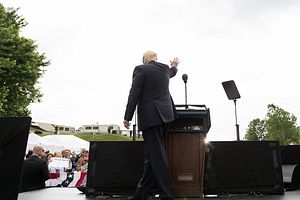North Korea and China are calling what they see as President Trump’s bluff — big time.
On June 13, Pyongyang sent the comatose 22-year-old college student, Otto Warmbier, whom they had imprisoned and brutally mistreated for 17 months, back to the United States to die.
Within 24 hours of his death, while Americans and their government were still coming to grips with the shocking proof of the Kim Jong-un regime’s depravity, reports emerged that Pyongyang was beginning active preparations for what would be its sixth nuclear weapon test, the first on President’s watch.
Also yesterday, Trump concluded that Beijing had failed to deliver on its commitment to push North Korea on the path to denuclearization.
The president was right to put the onus on China to help eliminate the North Korea nuclear and missile threat it has enabled for over two decades. He was also right to warn both Beijing and Pyongyang that the United States will resolve the matter if China could not or would not. Now, Trump’s red line has been crossed. Will he take the unspecified course of action he promised, or will this ultimatum prove as evanescent as President Obama’s chemical weapons red line in Syria?
Trump needs to reconsider his too hasty willingness to let China off the hook. The day before Chinese and U.S. officials were set to discuss the nuclear issue in a Diplomatic and Security Dialogue, Trump tweeted: “While I greatly appreciate the efforts of President Xi & China to help with North Korea, it has not worked out. At least I know China tried!”
Of course, all the president “knows” is that Beijing said it tried — just as it has been telling American administrations for over 20 years. Trump had heard all that long before becoming president. On the campaign trail, Trump indicated he saw right through China’s claims and would not tolerate the deception once in office.
Calling a nuclear North Korea “a potential catastrophe,” candidate Trump pointed the finger directly at China:
They say they don’t have that much control over North Korea. They have total control, because without China they wouldn’t be able to eat… China should solve that problem. And we should put pressure on China to solve the problem.
It should be as obvious to President Trump now as it was to candidate Trump then that Beijing has not employed anywhere near the economic leverage it has over North Korea — and that it never had any intention of doing so.
Nor has Beijing been coy about stating its reasons. Chinese leaders, diplomats, and spokespeople have repeatedly told Western counterparts that Beijing will not exert the full measure of pressure it could on Pyongyang because they fear precipitating the collapse of the Kim regime and a flow of refugees into China.
That “explanation” has been advanced for two decades by foreign policy experts, led by Henry Kissinger, who is now advising Trump on China. Yet its sheer illogic is striking. The argument is that North Korea, if faced with a credible ultimatum to give up its nukes or face actual collapse, would consciously choose regime suicide. In other words, we are to believe China cares more about the Kim regime’s survival than does the regime itself.
No, the more plausible explanation for China’s indulgence of Pyongyang’s nuclear and missile buildup is that it serves China’s strategic interests as it sees them (not as Americans believe it should see them). A nuclearizing North Korea is a major strategic distraction and and has diverted diplomatic and material resources under a series of U.S. administrations. The North Korea issue also enables Beijing to play the role of “responsible stakeholder” and good-faith negotiating partner for the West. It gives China leverage on all other issues — trade, currency, human rights, the South China Sea, Taiwan — because “we need China on North Korea.”
On all those matters, Trump recently made a series of preemptive and unilateral concessions to China in exchange for help on North Korea. Presumably, Kissinger had advised the president, the ultimate deal-maker, and Jared Kushner, his designated back channel to China, to avoid the common mistake Americans naively make:
We [Americans] have a tendency to apply our standards to others in negotiations. We like to pay in advance to show our good will, but in foreign policy you never get paid for services already rendered.
The president first needs to take action against North Korea — for Warmbier’s death and the nuclear test preparations — by imposing far more severe sanctions than heretofore applied. If China undercuts them, as it has always done in the past, the United States should apply secondary sanctions against Chinese entities doing business with North Korea.
Trump should also revisit the earlier gifts he gave to Xi by doing some or all of the following: placing a call to Taiwan’s President Tsai Ing-wen; announcing a new arms sale package to Taiwan; declaring an unambiguous commitment to defend Taiwan; sending a cabinet officer to Taiwan; directing a new, publicized, Freedom of Navigation Operation in the South China Sea (preferably the Spratlys, or near Scarborough Shoal); labeling China a currency manipulator (if the current facts justify it), etc..
Whatever blandishments Xi served up at Mar-a-Lago and afterward, it is time for the U.S. president, in his dealings with China, to demonstrate credibility, not credulity.
Joseph Bosco is a former China country director in the office of the secretary of defense, 2005-2006.

































